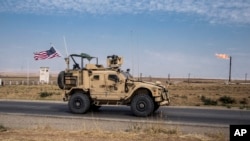While U.S. President Donald Trump this week reiterated his administration's intention to keep some American troops in Syria to control the country's eastern oilfields, experts and observers warn the president's comments could promote the view that the U.S. involvement in the Middle East is to extort revenue.
"We are leaving soldiers to secure the oil," Trump said on Sunday, while announcing the death of the Islamic State (IS) leader Abu Bakr al-Baghdadi during a raid in Syria's northwestern governorate of Idlib near the Turkish border. "And we may have to fight for the oil. It is OK. Maybe somebody else wants the oil, in which case they have a hell of a fight. But there's massive amounts of oil."
Trump further suggested that he could employ a U.S. company such as ExxonMobil to modernize the productive capacity of the oilfields and "spread out the wealth."
The remarks from the U.S. President are a "strategic messaging disaster" that could effectively play into the hands of American adversaries who argue the U.S. intervention in the region lacks legal basis, said Nicholas Heras, a Middle East researcher at the Center for a New American Security in Washington.
"[Syria's president Bashar] Assad and Russia can use Trump's statements as justification for launching attacks on U.S. forces in eastern Syria, and that means that by saying what he has said about Syria's oil, President Trump has just become a force protection nightmare for American forces."
Heras said Trump likely wants to use the control of the oilfields to recover American political leverage in Syria that experienced a dramatic decline earlier this month when the U.S. abruptly withdrew troops from Syria's northeast border with Turkey. Such influence, Heras argued, could help the U.S. play a role in shaping the future of Syria in a U.N.-backed political settlement to end the country's civil war.
"Trump's focus on Syrian oil is not about IS, it is about cutting down Assad's regime and dragging Russia kicking and screaming towards American demands for the future political structure of Syria through the Geneva process," Heras said.
Trump's statements have already drawn strong rebukes, including from Russia and Turkey that have gained more advantage in Syria after the U.S. withdrawal.
Russia's Syria envoy Alexander Lavrentiev on Tuesday said that all oilfields in Syria must come under the control of the Syrian government. His statement shortly followed Turkish President Recep Tayyip Erdogan claiming that the main objective of all countries involved in Syria, except Turkey, was to seize the natural revenues of the country.
"We face an intellect that values one drop of oil more than one drop of blood," Erdogan said in Ankara during a public speech marking the 96th anniversary of the Turkish republic.
Some experts charge that the Trump administration will struggle to find a legal justification given that international law prohibits a country from taking revenues of another sovereign state.
Laurie Blank, a professor of international law at Emory University in Atlanta, said the U.S. would still need the agreement of the Syrian government if it wishes to invest in those oilfields in the future.
"That interest seems to, at least in my mind, be based on a very ancient conception of war that doesn't exist anymore, which is the idea of conquest. You now, that you go, you conquer, you take. And the world doesn't work that way anymore," Blank told VOA.
If implemented, the policy will likely also violate U.S. congressional laws that authorize foreign intervention, said Daniel Serwer, an expert at the Middle East Institute and professor at Johns Hopkins University. He said the U.S. administration's involvement in Syria is under the Authorization for Use of Military Force Against Terrorists (AUMF) which would only allow securing oilfields to keep them out of the hands of terrorist groups such as IS.
Before IS started to lose territory in Syria and Iraq, it generated millions of U.S. dollars in illicit revenues by controlling oil and gas fields and smuggling their products. As the U.S.-led coalition pounded IS's tankers and oil infrastructure, U.S. Treasury Department and Iraqi oil officials said IS oil revenues plummeted by as much as 90% from a high of $80 million monthly in 2015.
The AUMF "certainly does not authorize war profiteering or conquest of oilfields in any explicit way," said Jeff Colgan, an associate professor of political science and international studies at Brown University.
Colgan added that the host of legal challenges, combined with limited infrastructure and small output, make American oil companies less eager to invest in the oilfields.
Before the outbreak of the Syrian conflict in 2011, the country produced about 385,000 of low-quality oil per day, according to Colgan. Nearly 100,000 of those barrels originated from the fields in northeastern Syria that Trump wants to control. That output had declined to only 40,000 barrels per day in 2016, according to the International Monetary Fund.
"As a part of the global oil market, that is a tiny fraction and less than 1%. So it's not on a geopolitical level very significant. But on the local level, Syria depended on that oil to satisfy a lot of their domestic consumption. And since they have been turning to Iran to get oil supplies and Iran has been sanctioned — Britain, United States, and others have been trying to prevent Iran from shipping oil to Syria — in that situation they can become locally quite significant."
Even if the underlying intention of the Trump administration in seizing the oil is to pressure Assad, the message that U.S. wants to profit from the oil will considerably damage the U.S. image globally, some experts argue.
"It will make people believe the worst of America," said Joshua Landis, the director of the Center for Middle East Studies at the University of Oklahoma, adding that Islamist extremists can use the message as a powerful recruitment tool to attract more members.
"The propaganda value of America's oil grab in Syria will be high for jihadists," Landis told VOA.







